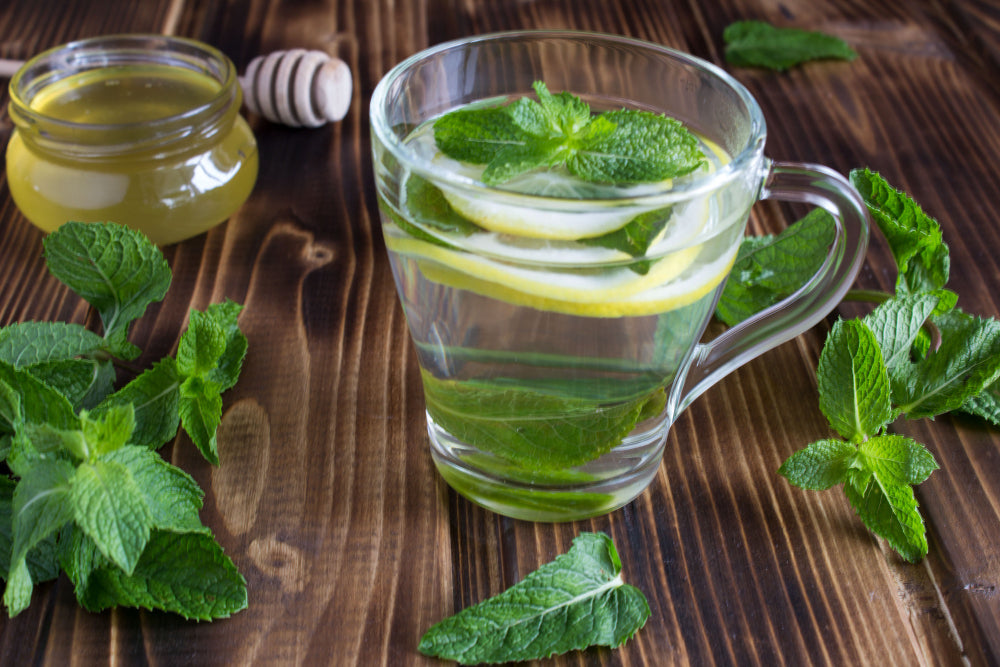15 Health Benefits of Peppermint Tea


Peppermint tea has been praised for its numerous health benefits. Doctors and experts in this field with scientific and medical evidence supporting these advantages are considered in this article. Every benefit will be examined in detail while using relevant data and the advice of professionals. Let's learn more about the 15 health benefits of peppermint tea.
Peppermint tea is beloved for helping with digestive relief. making peppermint tea famous for calming digestive discomfort. "Peppermint oil reduces the motility of muscles along the intestines, alleviating symptoms of bloating and flatulence," says Dr John Anderson, a gastroenterologist.
In 75% of irritable bowel syndrome cases, it was found that symptoms were significantly decreased by peppermint oil, as found in the Journal of Clinical Gastroenterology.
The menthol present in peppermint tea can act as a decongestant thus making it an effective medication for any respiratory problems. “Menthol helps to expand nasal passages, facilitating easy breathing,” explains Dr Emily Roberts, a pulmonologist. This becomes very helpful to people with asthma or chronic bronchitis especially. A study in the European Respiratory Journal found that menthol vapours could improve respiratory function in patients with mild to moderate respiratory conditions.
Peppermint tea is a calming tonic that can help with stress and tension. Dr Sarah Thompson, a psychologist, explains that "the aroma of peppermint can trigger the release of serotonin, a neurotransmitter associated with mood regulation."
Journal of Herbal Medicine has pointed out in a clinical trial that participants who took peppermint tea recorded a 20% decrease in anxiety levels. In essence, this implies that peppermint tea is an easy and natural way to handle stress.
Peppermint tea has both antibacterial and antiviral characteristics to boost the immune system. Dr Richard Lee, an immunologist, highlights that "the compounds in peppermint, such as rosmarinic acid, have been shown to inhibit the growth of various pathogens."
Additionally, the Journal of Ethnopharmacology agrees with this by showing how peppermint extracts can inhibit certain bacteria and viruses. This makes it necessary for individuals to regularly drink peppermint tea to maintain their defences high.
Various types of pain like headaches as well as muscle aches can be relieved through using of peppermint tea which contains analgesic properties. Dr Amanda Green, a pain management specialist, notes that "menthol, the active component in peppermint, acts as a natural pain reliever by desensitising pain receptors."
According to the International Journal of Clinical Practice, one study found that applying topical oils containing peppermint helped reduce the severity of headache pain among sixty per cent (60%) of those assessed. Drinking mint-flavoured herbal teas might have similar effects thus making them perfect for non-pharmacological solutions towards combating pain.
The antimicrobial effect present in peppermint tea leads to an improvement in oral hygiene. Dr Steven Clarke, a dentist, states that "peppermint oil has been found to be effective against oral pathogens that cause bad breath and dental caries." In the Journal of Oral Microbiology, it was found that peppermint oil prevents bacterium growth such as Streptococcus mutans.
Peppermint tea is rich in antioxidants and this helps in protecting the body from oxidative stress. Dr Laura James, a nutritionist, explains that "antioxidants neutralise free radicals, thereby reducing the risk of chronic diseases such as heart disease and cancer."
A report in the Journal of Agricultural and Food Chemistry indicated that peppermint tea was highly antioxidant, similar to green tea. Therefore, peppermint tea has a future potential as an important supplement to any health-conscious diet.
Peppermint tea has been found to help in weight management by promoting satiety and reducing appetite levels. Dr Michael Turner, an endocrinologist, mentions that "the scent of peppermint has been shown to curb cravings and decrease overall calorie intake."
According to a publication in Appetite Journal, participants who inhaled peppermint essential oil ate fewer calories for the whole day. In order to manage weight effectively, it is advisable to include peppermint tea as part of the plan.
Peppermint tea is found to have anti-inflammatory properties which helps improve skin health by reducing redness and irritation. Dr Rachel Adams, a dermatologist, points out that "peppermint tea can soothe the skin and may be helpful in managing conditions such as acne and eczema."
Journal of Dermatological Science research shows that peppermint extract reduces skin inflammation thereby promoting healing purposes. Thus, using peppermint tea topically or consuming it regularly can promote healthier skin.
Peppermint tea helps enhance cognitive function and mental clarity. Dr James Wright, a neurologist, notes that "peppermint has been shown to improve memory and concentration by increasing blood flow to the brain."
International Journal of Neuroscience study points out that exposure to peppermint aroma in tasks demanding sustained attention significantly improves cognitive performance. This implies that having a cup of peppermint tea when studying could enhance mental clarity and focus.
The antimicrobial properties of peppermint tea can help protect against infections. Dr. Lisa Morgan, a gynaecologist, explains that "the muscle relaxant properties of peppermint can ease uterine contractions, reducing the severity of menstrual pain."
A study in the Journal of Obstetrics and Gynaecology found that peppermint oil was effective in reducing the intensity of menstrual cramps in 56% of participants. This suggests that peppermint tea could be a beneficial natural remedy for menstrual pain.
The calming effects of peppermint tea help promote better sleep quality. Dr Alice Brown, a sleep specialist, highlights that "peppermint tea can relax the muscles and mind, making it easier to fall asleep and stay asleep."
Research published in the journal Phytotherapy Research found that participants who consumed peppermint tea before bed reported improved sleep quality. Incorporating peppermint tea into a bedtime routine may enhance overall sleep health.
Peppermint tea contains compounds that can alleviate symptoms of allergies. Dr Robert Hall, an allergist, states that "peppermint has anti-inflammatory and antihistamine properties that can help reduce allergic reactions."
A study in the Journal of Allergy and Clinical Immunology found that peppermint extract reduced histamine release in allergic responses. Drinking peppermint tea during allergy season could provide symptomatic relief.
Peppermint tea may support cardiovascular health by improving blood circulation and reducing blood pressure. Dr William Scott, a cardiologist, mentions that "the vasodilatory effects of peppermint can help lower blood pressure and improve overall heart function."
A study in the journal Phytomedicine found that peppermint oil reduced blood pressure in hypertensive patients. Regular consumption of peppermint tea could thus contribute to better cardiovascular health.
The antimicrobial properties of peppermint tea can help protect against infections. Dr Susan White, an infectious disease specialist, notes that "peppermint has been shown to inhibit the growth of various pathogens, including bacteria and fungi."
Research in the Journal of Applied Microbiology found that peppermint oil effectively inhibited the growth of several harmful microorganisms. Drinking peppermint tea may therefore help in preventing infections.
Yes, it is generally okay to drink peppermint tea every day. It is a natural herbal tea that offers several health benefits and is generally considered safe for most people. However, individuals with specific conditions, such as gastroesophageal reflux disease (GERD) or those who are pregnant, should consult with a healthcare provider before regular consumption.
Yes, peppermint tea can help you sleep. Its calming effects can relax the muscles and mind, making it easier to fall asleep and stay asleep. Some studies have shown that consuming peppermint tea before bed can improve sleep quality.
Peppermint tea offers a wide range of health benefits, from aiding digestion to boosting immune function, making it a valuable addition to a healthy lifestyle. As always, it is important to consult with healthcare professionals before making significant changes to your diet or health regimen. If you are interested in learning more about other tea like 7 Earl Grey Tea Benefits and Uses or 7 Benefits of Red Tea (Rooibos Tea), continue reading.








Plus get the inside scoop on our latest content and updates in our monthly newsletter.